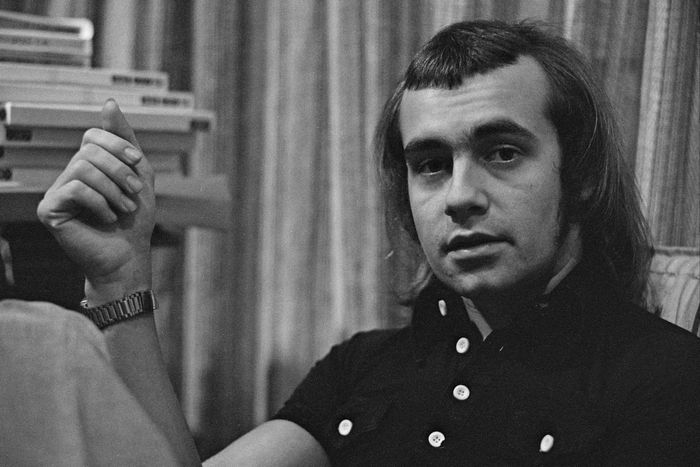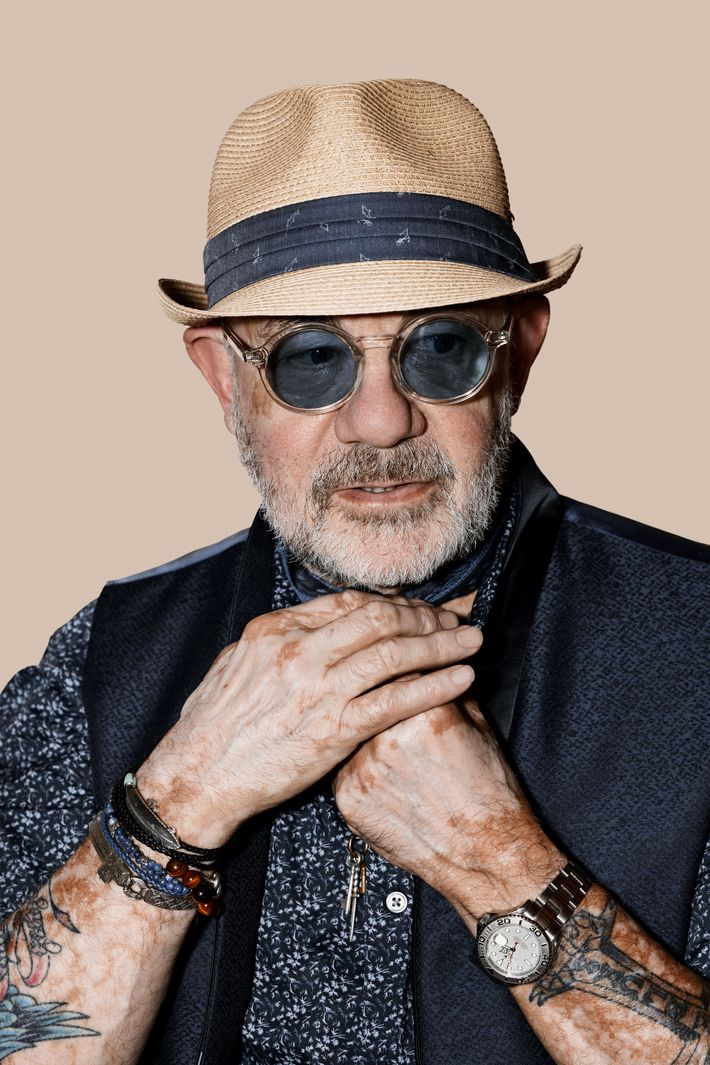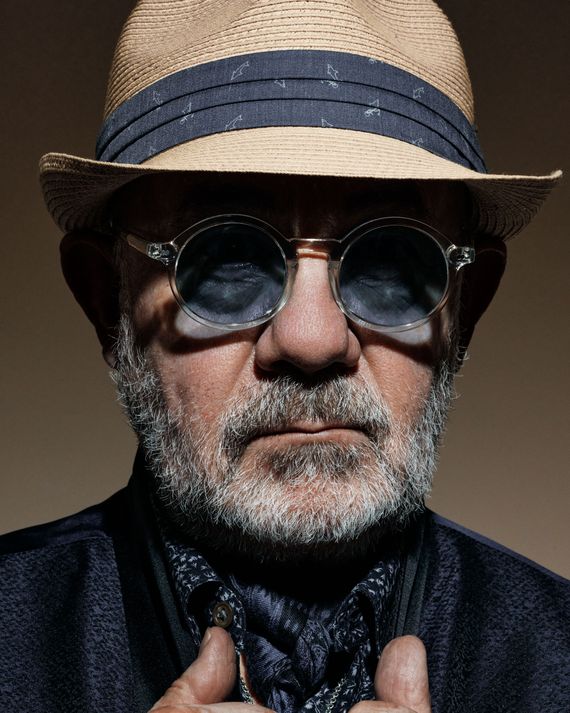
This article was featured in One Great Story, New York’s reading recommendation newsletter. Sign up here to get it nightly.
For more than 50 years, Bernie Taupin has given Elton John’s indelible melodies far more than their words. He has given them their plots, characters, settings, attitudes, even their worldviews. His lyrics tell stories — often eccentric ones — and John makes them sing. And nearly always in that order. Their rare way of writing — with each working separately, often in different parts of the world, before conferring on small tweaks to set everything in perfect sync — has created one of the most enduring and profitable relationships in pop history. The two famously found one another other by fluke in 1967 after they each answered an ad in New Music Express from Liberty Records looking for fresh talent. When John told the label he could write music but not lyrics, he was handed an envelope with poems blindly submitted by Taupin.
Though John has talked endlessly about the avalanche of events that ensued in the years since, Taupin has less often done so — and certainly never with the specificity and flair he has in his new memoir, Scattershot (out September 12). Though he took a stab at writing his own story in 1988 (A Cradle of Halos: Sketches of a Childhood), it was only published in the U.K., and the book essentially ends before his career even begins. Scattershot has its own fascinating parameters. True to its title, it isn’t a conventional blow-by-blow life chronology but instead a wild array of colorful anecdotes and drunken adventures. “It’s a book of incidents, happenstance, and kismet,” Taupin says, likening the result to another leapfrogging music memoir, Chronicles, by Bob Dylan. Like Dylan, Taupin’s isn’t big on detailing a song’s meaning or inspiration. But if you’re patient, there are plenty of tasty revelations along the way.
Many more arose in the long conversation I had with Taupin recently at his home located three hours north of Los Angeles, in a verdant valley above Santa Barbara. In contrast to the castlelike abodes that John commands around the world, Taupin’s house is a lovely but — by his considerable means — modest Spanish ranch-style home. “It wouldn’t matter if I was Elon Musk,” Taupin said as we sat in his tranquil backyard. “I’m much more at ease with a smaller world and a simpler life.”
Elton published his memoir, Me, four years ago. Did you consult with him on that?
Actually, no, but I really enjoyed it. It sounded like Elton. Some things in it really made me laugh out loud, like the description of R&B musician Billy Stewart stopping to pee by the side of the highway. I didn’t really go to Elton for any advice on my book either.
Did you learn anything from Elton’s book that you didn’t know about him, or vice versa?
Not really from him, but after Elton read my book, he said, “It’s absolutely brilliant. But I didn’t know you didn’t like Blue Moves. That’s one of my favorite albums!” I said, “I didn’t say I didn’t like it. I said I made some poor choices in what I wrote about.” Some of the songs are too depressing. It’s got some good stuff on it: “Cage the Songbird,” “Idol.” But I think it probably could have been a single album.
In your book, you write relatively little about Elton, though his name appears before yours in the subtitle (“Life, Music, Elton & Me”). Why?
Maybe the title is unfortunate. I actually fought against it initially. But that’s publishers for you! And, ultimately, they’re correct because his life and mine are so locked up in each other that even when I’m on my own, he’s ever present. At the same time, I don’t think people realize that, from the time we first came to the States in 1970, me and Elton took off on different paths. That’s not to say that we didn’t remain as close. In fact, in some ways, I think we’re closer now because we understand each other. But my book couldn’t be about Elton because out of a possible 100 percent, we see each other maybe 15 percent of the year.
In reading Elton’s book, did you have different memories of the way things happened than what he presented?
There were just a few things as far as where things happened. I know for sure that he was in Toronto and I was in Barbados — not the other way around — when he called me and said, “I’ve got this melody, and I need a sort of Marvin Gaye–Tammi Terrell duet lyric thing.” I was hammered by then, so I stuck my head in an ice bucket and in ten minutes came up with the lyric for “Don’t Go Breaking My Heart.” Maybe it’s not “Sad Eyed Lady of the Lowlands,” but it paid off in spades!
Neither you nor Elton wrote a lot about the songwriting process in your books. Did you do that to preserve the imagination of the listener?
It’s more fun to have people figure what a song is about for themselves. Also, there’s the quote from Lou Reed: “Just because I wrote it doesn’t mean I know what it’s about.” That’s so true! If you listen to “Sorry Seems to Be the Hardest Word” or “Don’t Go Breaking My Heart,” it’s not hard to figure out what those songs are about. But the spectrum of subject matters that we have covered over the years has allowed us to do the esoteric, the blindingly obvious, and everything in between.
In the book, you do reveal the inspirations for some songs that you’ve rarely or never discussed before. For instance, the person you were first thinking of in “Candle in the Wind” wasn’t Marilyn Monroe but Montgomery Clift.
I just found him more interesting than her. I am not as besotted with her the way a lot of people are. And, I guess, I was being a bit materialistic by coming to the conclusion that Montgomery Clift wouldn’t resonate with the public the way Marilyn did simply because she was viewed as far more vulnerable, though in my estimation, so was he. He was a pretty delicate flower. But people don’t know that.
To that point: He was a gay man who, in his day, was forced to live in the closet.
Absolutely, though I don’t know if I was even aware that he was gay back then.
That’s interesting because by that time you were well versed in gay culture. You wrote in your book about guys cruising you in Soho in London when you were a teenager and about meeting the musician Long John Baldry, who was extremely flamboyant and who Elton had played with in the band Bluesology before he met you.
Long John Baldry showed me things that were extraordinary for a kid of my age.
Such as?
Subterranean gay clubs. You have to remember that back in the ’60s, it was still an offense and it was pretty dangerous. It was a whole different culture. I don’t think the word gay was even used. So much of the terminology that is current didn’t exist back then. There was no attitude of trying to change things. It was a surreptitiously comical world to a certain extent and sad at the same time because these people had to exist in this netherworld. It’s been interesting for me to see how gay culture has evolved over the years. Long John Baldry was the ringmaster for the initial phase.
It’s also interesting that you, a straight kid from a rural area in northern England during a very benighted time, never felt in any way threatened by gay culture or behavior. Similarly, you tell a story in your book that takes place when you were first writing songs with Elton at his childhood home. At one point he, almost unknowingly, put a hand on your knee. The incident passes without either of you addressing it directly, but it’s clear that you had no judgment about it. To what do you credit your accepting attitude?
A lot of that has to do with how I was raised. My mother was an extraordinary woman, a complete bohemian in her youth. She had been raised around a lot of gay people. She ran with a very arty crowd. Through her, I had tolerance for a lot of things that kids in my area did not. While I was raised in a country area, my parents came from the city. They were urbane.
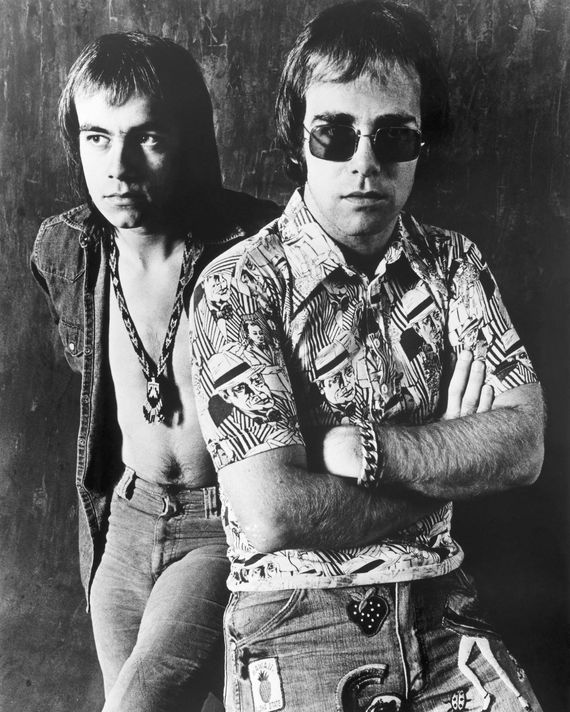
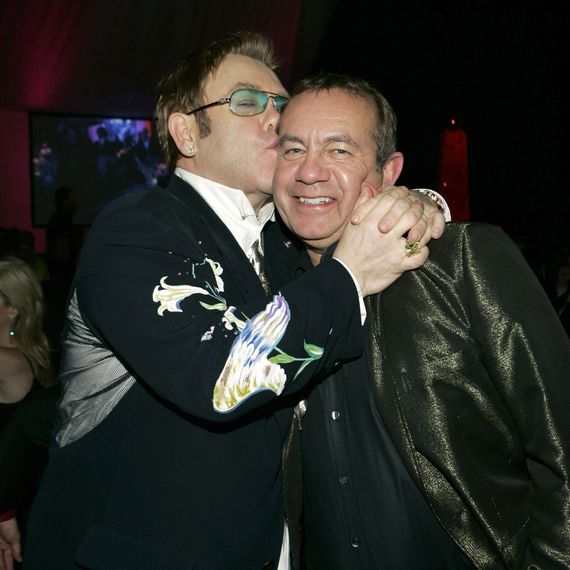
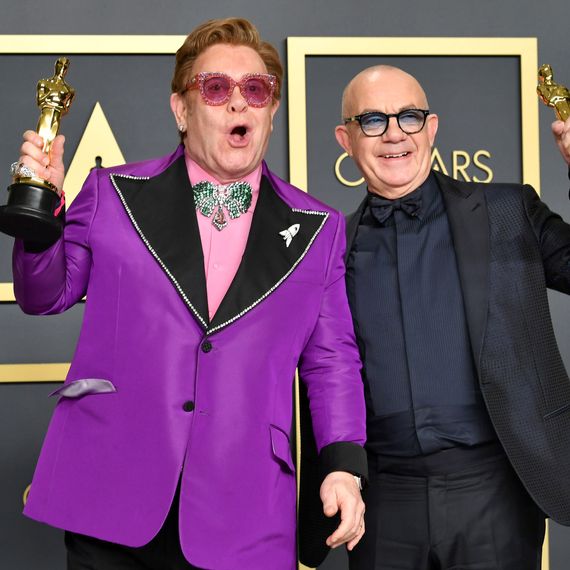
Was she also responsible for your literary interests?
Yes, and through my dad. That’s where I got my love for Graham Greene, who he read religiously.
Has Graham Greene’s work affected the subjects and characters you write about in your songs?
His characters are indelible in my work. They were completely flawed — the lonely wives, the whiskey priest. If you take an album like Goodbye Yellow Brick Road, there are no love songs on it. It’s about individuals and characters, like “Sweet Painted Lady” and “Danny Bailey” and “Dirty Little Girl,” people on the seedier side of life, misfits and outsiders. The thing about writing songs for me — I’ve never felt I was very good about writing anything that dealt with happiness because I don’t think happiness is very interesting. It’s wonderful to exist in, and be around, and create on a family or social level, but to write about it? It always reminds me of the beginning of Blue Velvet, when the camera pans across all these idyllic backyards with green grass and sprinklers going off and then it pans beneath the earth where you see the dirt and the worms. That’s what’s interesting to me.
That’s a fascinating approach for a writer who has had such a profound impact on the pop mainstream. Most songs that are as popular as yours express idealized love or bland pining. Yours are unconventional.
I’ll tell you exactly why. I have a thing: I cannot lie. There’s too much lying in the world. Everybody lies now. It’s like an accepted vice.
Are you referring to Trump? George Santos?
I’m not going to blame one side or the other. You can say Trump, you can say Biden. They all lie. Every time Kamala Harris opens her mouth, she usually says something stupid or lies. They’re like cookie-cutter villains. I have no time for any of them.
I’ll tell you what bothers me in songs — when somebody states something that I don’t believe is true. How many songs have you heard where the lyric says, “I’ll die if you don’t love me.” No, you won’t! You’re not going to die! I will never, ever write something like that.
Are there other things in pop songs that drive you crazy?
There was a Kenny Rogers song, “The Gambler.” The first line says something about a “train bound for nowhere.” What do you mean? That train is going somewhere, man! I know that’s supposed to be a metaphor, but it’s still dumb. Also, there are rhymes where you go, Well, that was done purely to find a word to rhyme with that earlier line. That’s like Billy Joel writing, “making love to his tonic and gin,” instead of gin and tonic in “Piano Man.” One of the worst ever! Because who says, “tonic and gin?” I’d kill myself rather than do that!
Your mandate to tell the truth in your lyrics has inspired you to write some really edgy songs with titles like “Jamaica Jerk Off” or “Social Disease,” which is about a guy who gets bombed at breakfast. Do you find it odd that such songs, which were both on Goodbye Yellow Brick Road, sold in the millions and passed in the mainstream without comment?
I’m flabbergasted. The fact that our tracks weren’t banned! I mean “Rocket Man” wasn’t banned, and it talks about being “high as a kite by then.” Back then, radio was incredibly sensitive to any references to drugs or sex. Our songs were riddled with them. “The Bitch Is Back” got played! Someone once said that Yellow Brick Road was one of the filthiest albums ever made, and it’s probably true. It’s all about weird situations, gay situations, straight situations, pornographic situations. “All the Young Girls Love Alice,” which has a line like, “two middle aged dykes in a go-go,” got played on the radio! I’m incredibly proud of the fact that we tested the waters and got away with things.
By contrast, your breakthrough hit, “Your Song,” was totally sweet and naïve. Were you that way back then?
That’s almost written by somebody who’s never had sex. And I probably hadn’t at the time. [Laughs.]
You wrote that breakthrough song with Elton in 1969 when you were both teenagers — and you say you wrote the lyrics in 10 or 15 minutes. Did you know immediately, This is it?
Not after I wrote the lyrics. Certainly, after Elton composed it. There was sort of a look between us of, Hmmm. We might be onto something here. I remember Elton’s mother coming back in the evening and hearing it and saying [affecting a Monty Python–style middle-aged British lady’s voice] “Oh, that’s pretty nice. I like that one!”
To me, the part of the song that grabs the heart comes in the hesitations toward the end, when the narrator says, “Anyway / The thing is / What I really mean,” before working up the nerve to say, “Yours are the sweetest eyes I’ve ever seen.” It puts the listener inside the narrator’s head. Did you design it that way?
I think the apprehension, the pregnant pauses, that you hear were probably put in there because that’s how I was writing it. I was hesitating. Believe me, I didn’t have that in mind at the time. That’s a beautiful accident.
When you first moved to London, you and Elton were writing and living together. What kind of roommate was he?
We got on great. We were inseparable. We never fought. I mean it really was him and me against the world. He was certainly more cosmopolitan than me. He played in bands. He traveled around the Continent. So obviously he’d done a lot more than I had. I was a little green behind the ears, but I was, hazard to say, pretty intelligent. I was well read. I was well versed in the arts. But I was also very shy. I was pretty sensitive, and Elton understood that. He was definitely a big brother.
When you first began writing with Elton, there were hardly any examples of non-musicians writing lyrics for popular acts. There were just two that I know of in England — Keith Reid with Procol Harum and Pete Sinfield with King Crimson. Were they role models for you?
I certainly wouldn’t call them role models. But I’m sure we tried to emulate the things that both Procol Harum and King Crimson were doing. At the time, I was a bit impressed by Pete Sinfield’s work on In the Court of the Crimson King. It was very much in the same wheelhouse as I was trying to form lyrics at the time. I was reading a lot of science fantasy and mythology. A lot of the things on the Empty Sky album, like “Val-Hala” and “Sails,” had references to things like Vikings and sailing ships into the docks of dawn, like Led Zeppelin. On the Elton John album, there were things like “The King Must Die,” which was a complete lift from Mary Renault. One of her books was called The King Must Die. Then, when I realized that you could write Americana-style songs, I moved on and left all the psychobabble behind.
You did so decisively on Tumbleweed Connection in 1970. It was wall-to-wall Americana. Many music critics think that it was the best Band album the Band didn’t make. Robbie Robertson died recently. You knew him, right?
Yes. In fact, we played Robbie an acetate of Tumbleweed Connection before it came out. It might have been at the Warwick Hotel in New York. He invited us up to his room. He said he loved it and, due to that, the Band came and saw us at a few gigs.
I have the Band to thank for really breaking down a wall for me because those were the kinds of things I wanted to write. I wanted to write about the West. I wanted an Americana slang to come into play, and I wanted to write about American history. But I felt, Are people ready for this? It was still Cream and Jimi Hendrix and all those very psychedelic bands. It was loud and hippieish. The Band completely changed all that.
As much as you love Robbie, the other members of the Band often said that he unfairly hogged credit for their work and, so, got most of the profits from the publishing. Levon Helm was particularly vocal and angry about it. Where do you fall on that?
I have to say I kind of lean into Levon’s camp. I don’t want to speak ill of the dead now that Robbie has passed. All I can say is that I think Robbie’s ideology drifted and changed. He had come a long way from Woodstock and the Band in the basement. Robbie liked high society. He liked to travel with the elite. One of the things Robbie got knocked for was the documentary he did on the Band. He waited until everybody had died, except for Garth, but Garth is pretty incapacitated now. Rick Danko was the one I was closest to in the group. Levon was an interesting guy.
How so?
He was kind of a prickly character. He was much more hardscrabble than the rest of them because he came from a different area than they did. When they invented the characteristics that the Band would trade on — those mountain-men characters — that was a bunch of guys playing dress-up. The only one who I don’t think was, was Levon. He was the real deal. I remember being in a room once with Levon and somebody was talking about how there were rumors about Jerry Lee Lewis shooting his wife and that he’d also taken a shot at his drummer. The thing I remember Levon saying was, “Man, it’s one thing to shoot your wife, but you do not shoot your rhythm section.” I thought that was pretty funny.
Before the Band, you were drawn to American country music. That’s a striking contrast to most young British artists of your generation who were more taken with American blues or R&B. Why was country your muse?
It was more narrative than those other forms. There were stories, and I gravitated to stories. I was raised on narrative poetry, like “The Highwaymen” and “The Ballad of William Sycamore,” “Horatius at the Bridge,” Lochinvar. My grandfather and my mother would read them to me. They were like my comic books. As a kid, I would play out these characters and wield my wooden sword and ride my imaginary horse. Similarly, guys like Marty Robbins, Johnny Horton, and Johnny Cash, these guys were telling stories — “Sink the Bismarck,” “The Battle of New Orleans” — and made some of the first records I got my hands on. Because I grew up in the north of England, I wasn’t cosmopolitan enough to be aware of the advent of rock and roll in the way that they were in London. How many people have said to you, “I saw Elvis, and it changed my life?” I never saw Elvis on TV, so he didn’t really mean anything where I grew up. Country music made me want to be a writer.
Beyond the sound of the music, it seems you were also taken with the American character of the cowboy. Where did that passion come from?
The first cowboys I saw on television were really cliché things like the Lone Ranger or Roy Rogers. When I saw the Lone Ranger, I went, Nah, that’s not the way it was. The silver-plated guns and skintight suits and white hat just wasn’t happening for me. As time went by, I saw a couple of John Ford movies, and even though I was never a John Wayne fan, Ford’s movies had a more rugged edge to them, and I thought, Yeah, this is a bit more like it. Then I saw Fred Zinnemann’s High Noon, which I loved. There’s something edgy about it. Gary Cooper was so brilliant and so stoic. Then, of course, everything changed when Sam Peckinpah came and blew everything away. His films were dusty. I went, That’s it!
And yet you wrote a song about the very slick western star “Roy Rogers” on Yellow Brick Road.
That was somebody I imagined living on a council estate somewhere in the north of England seeing a flickering black-and-white TV and being nostalgic and thinking, Oh well, I’m in this lifestyle, and it’s drudgery, and I have to get up every day and go to work. It was their fantasy dream of somebody in that situation of being Roy Rogers.
There’s a parallel bit of confusion about the song “Levon.”
Everybody assumes it was named after Levon Helm. I’m not sure it was.
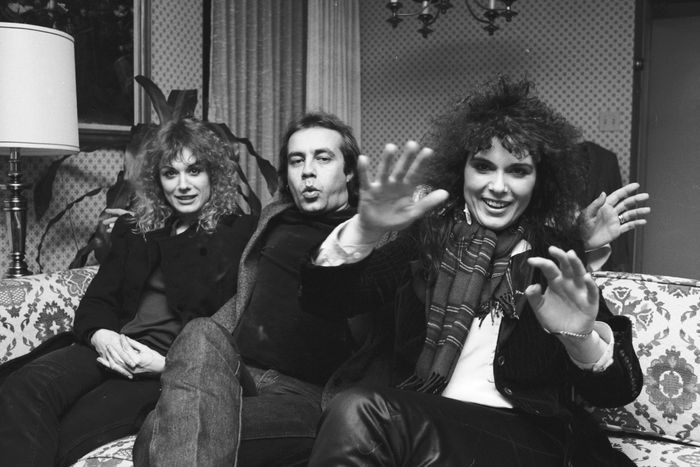
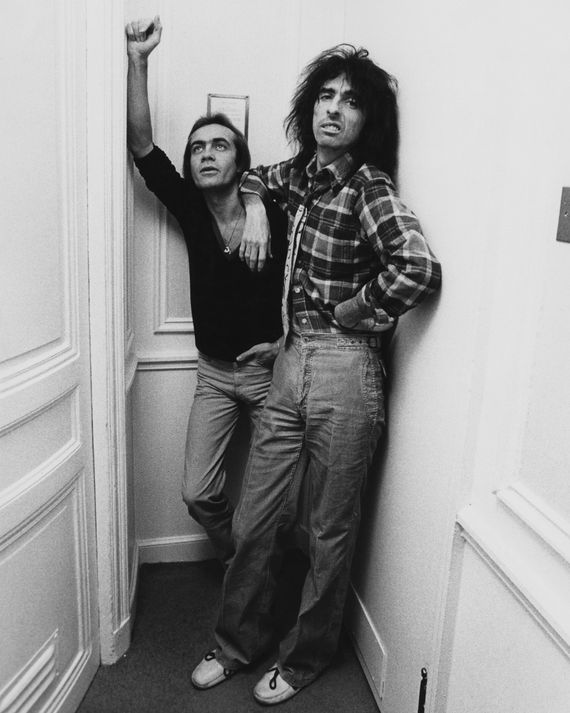
Well, how many Levons are there?
Exactly! But I don’t remember going, Yeah, I’m going to use Levon’s name for this song. That’s not how things work with the way I write. People assume the songs are about things when they’re not. In the book, I write about people thinking “I’m Going to Be a Teenage Idol” was about Marc Bolan, and it wasn’t. It could have been, and maybe it should have been, but I didn’t set out to do that. People think “Idol” is about Elvis, but I don’t think I’d ever set out to write a song about Elvis.
In Elton’s book, he says that people always think some songs you wrote are about him that aren’t. Can you give an example?
The one that everybody gets wrong is “I’m Still Standing.” They all think it’s about Elton’s strong will to survive, and it wasn’t. It was written as my kiss-off to an old girlfriend. But I’d rather that people think of it as an anthem for Elton. It makes more sense because the bitterness of the song towards the person it was originally aimed at is gone. We’re good friends now.
People also think that “Daniel” is about Elton and a gay relationship.
Well, “Daniel” has been well chronicled for what it really is about. You know who was appalled that “Daniel” was not about a gay relationship? Boy George. He wouldn’t believe it. He was completely affronted by that.
Which songs of yours did, in fact, refer to Elton’s sexuality?
The only one I can think of is “All the Nasties” on Madman Across the Water. The line “If it came to pass that they should ask / What could I tell them?”
That whole song seems to be about Elton sniping back at the press. What prompted that back in 1971?
We were becoming increasingly popular, especially in the States, and the British music press, being what it was at the time, had a tendency to knock down what they had built up. That song was my response in defense of my friend. It was all very churlish and unnecessary. They should have been proud of him for countering the burgeoning American singer-songwriter movement and being their champion.
I always thought that the song “The Diving Board” — which is about someone really putting themselves out there in front of the world — was about Elton. Was it?
It certainly could have been. You can write something without intentionally meaning for it to be about a particular person but, after you’ve completed it, perhaps subconsciously you did. Preordained prose. I try to put a little bit of both of us into the songs. I don’t want to hog the limelight lyrically.
I wanted to ask a bit about your writing process with Elton. I think everyone is fascinated by the fact that you work mainly separately and that you write the words first, having no idea what the music will be like. Because you write first, and then Elton has to conform to that, don’t you have a bit of an advantage?
Yes. I think maybe the content of the lyrics stipulated what the song should be. If you write “Saturday Night’s All Right for Fighting,” and read the lyrics, you can’t imagine it as a ballad. And then if you read “Don’t Let the Sun Go Down on Me,” you don’t hear that as a Chuck Berry riff. So I think the lyrics themselves dictated the melody ultimately. But he likes it that way and we’ve done it for decades. It’s definitely the way I like to work, but at the same time, I don’t mind if he jerry-rigs things after I’ve written it. If he says, “That doesn’t quite work there,” or “This is a little too long,” we edit something out.
It has certainly become far more discussed in musical terms over the decades simply because I was musically deficient when I started. When I started, I didn’t really know how to write a song. You see a lot of those early manuscripts, they’re all over the place. There’s no such thing as a bridge or an extended verse or chorus. So, Elton has my everlasting admiration for being able to make any sense out of any of it. On our very first album, Empty Sky, when you see the lyrics printed on the sleeve, they’re made to look like they know what they’re talking about. If you saw the original manuscripts of them, they would look very different. But as I became a bit more musically proficient, up to the point where I couldn’t write a lyric without a guitar — like Linus and his security blanket — it gave me more of a melodic structure. I wouldn’t just say, “Here they are” with the lyrics and run away and then he would have to try to make head or tail of them.
In that sense, was Elton your editor early on?
I suppose so.
Despite the great connection you two developed in your work, you have lived separately since the early ’70s. How did Elton feel when you first left England to live in America?
It was fine because on the first trip to the United States, he entered into his relationship with John Reid. They were cohabitating, and I had my own place. My eyes were ever across the seas in America.
In 1970, you guys were already getting big in the U.S. But by the mid-’70s you weren’t just big. You were Beatles big. When did you first realize the insane scope of your fame?
I’m not sure I ever did! [Laughs.] The thing about Elton is his ability to track everything. You’re talking about a guy who knows every place he’s ever played and when he played it. He followed all the charts. He still does! I never did that. I never knew where our records were on the charts. I mean, somebody would tell me, “We came in at No. 1.” I’d say, “Great, cool. Now let’s go get a drink.”
But, in the early days, you were more a part of the circus, right?
When we first started in the States, I would go on all the tours because that was my life. Then, I got a life outside of it. Before, I was in all the places the band was. In the early days, we’d have a Greyhound bus, and I don’t mean one of those rock-and-roll touring buses. I mean a Greyhound bus with no bathroom! You’d spend all your time traveling. But when we’d stay in these places, I’d make sure to go out and see things and try to improve my education, especially in New York. I loved New York. I even loved it back in the ’70s when it was rotten and miserable. Once I became acclimated, it was fantastic.
Was the song “Mona Lisas and Mad Hatters” written about that acclimation process?
Definitely. “Mona Lisas” was begun the first night I got to New York when a guy was shot outside my window. That’s when I wrote “Rose trees never grow in New York City.” But that song wasn’t finished until far later. Like a lot of things back then, I would write lines down and maybe a notation to say, “Wrote this in New York City, 1970, November,” then file it away. Then when we’d come to writing an album, I’d bring out all my bits and pieces and go, “I remember this. I can embellish this.” In the case of “Mona Lisas,” half of that was the fear of New York and being slightly despondent with it after coming there from the Garden of Allah in L.A. But when I came back to it, later on, I made the addition of, “Hey, it’s not so bad.”
You wrote a sequel song, “Mona Lisas and Mad Hatters (Part 2),” 12 years later, on the Reg Strikes Back album. Why did you want to do that?
I don’t know. It wasn’t a very good idea. To be honest with you, I can’t even remember how the song goes or what the lyric is.
It presents a sunnier view of the city.
Maybe I was just trying to make it clear that I wasn’t knocking New York, which was probably unnecessary. Elton played the original song at the “Concert for 9/11” and nobody said, ‘That’s an anti–New York song. Why would you play it?’ I think people already realized it was a salute.
Of course, as Elton’s fame escalated in the ’70s, he became more and more outrageous in his presentation. He became known for wearing the most theatrical costumes imaginable. What did you think of things like him coming onstage dressed as Donald Duck in his show in Central Park in 1980?
I loathed that. And he knows I loathed that. He got his comeuppance for it because he couldn’t sit down at the piano bench with that ridiculous outfit on. Some of those outfits were so silly that, at some point, I just went, “If you’re going to sing ‘Don’t Let the Sun Go Down on Me’ dressed as Aladdin or as Tina Turner, it’s your prerogative.” I certainly much preferred it when he toned it down.
As the ’70s went on and you became more successful, Elton started to get lost in drugs. You also did your share, mainly cocaine, and you even freebased once. But you never went nearly as far as Elton with that stuff. Why?
There was a part of me that always managed to pull back from the edge before I fell in. I would say my drug use was recreational. It wasn’t consistent. I don’t remember doing drugs during the day. The whole freebasing thing, I went, This is not the road I want to go down, because I knew where it would lead.
However, for most of the period of the book, you are wildly, hilariously drunk. From the writing, I get the idea you are not in any way repentant about that?
Oh yeah, and you know why? Because I was never a mean drunk.
Are you sober today?
I still like a drink. But I stopped taking drugs cold.
In terms of Elton’s far more intense indulgences and the dangers of it, did you ever worry he might die?
I don’t know if I felt it could go that far. After the shows, we would all go to our rooms or to the bar, but Elton was on his own, probably very much abusing his body. Had I been privy to that, that would have alarmed me more. I was just more concerned with being in the moment and trying to defuse things. Elton could be very loud and very illogical. The last complete tour I went on was Sleeping With the Past, which was right prior to him going into rehab. I remember being on the plane with him and he’d say, “I’m not going to do the show. Cancel it!’ Even I couldn’t argue with him, and it wasn’t worth it because I knew that, ultimately, he wasn’t going to cancel the show. You just had to wait for the hot air to evaporate.
Even so, it must have been a feeling of profound powerlessness you felt in those situations.
In the book, I write about when I was in Paris with him, attempting to write. That’s when he was in the depth of addiction, and he wouldn’t want to start work until three in the morning, which completely threw off my clock. He’d ask me to come over to his apartment and try to do some writing. He’d sit there for hours and hours banging out these not particularly good melodies and say, “Can you come up with something for this?” It just wasn’t happening. The apartment itself was so depressing. It was dark, and there were all these weaselly drug dealers hanging around.
A more comical, or at least absurd, example of Elton’s irrationality during that period had to do with his announcement in 1984 that he was getting married to a woman. When news of that broke, you can imagine how gay people like me felt.
Traitor! [Laughs.]
Why do you think he did it?
That remains a mystery to everyone, including Elton, to this day. It was such an insane period, certainly with drugs and alcohol. It started when we were in Montserrat and he got very, very close to this girl Renate, who was an engineer. He would spend hours with her. I don’t remember anyone thinking it was odd at first. But it got stranger in Australia, where, as everybody said, “He went out for a curry and came back saying, ‘I’m getting married.’” But nobody tried to stop him. He was so set in his ways, you couldn’t tell him no.
By getting married, do you think he was trying to present a straight image to the public?
He wasn’t doing it for any other reason than he felt like doing it at the time. But the whole thing was a ridiculous, Felliniesque episode.
Of course, eight years before, in 1976, Elton had come out to Rolling Stone as “bisexual,” which, again, struck many gay people at the time as a bit of a dodge, especially since that was quite a common move among gay people who, back then, didn’t want to risk fully committing.
He was a little half-hearted on that.
At the same time, even that halfway declaration was ballsy for 1976 and it did have a financial effect on him, right?
It definitely hurt him but only temporarily because we had massive sales after that. It was a little bit like our version of John Lennon saying the Beatles were bigger than Jesus Christ. It was a temporary hiccup.
What about when Elton finally did come fully out in the ’90s. Did it make his life lighter?
I’m sure that when he came out 100 percent, it was easier. You don’t want to be hiding from anything.
By the late ’70s, you and Elton took a break from each other as writing partners. You write in your book that the split was amicable, but you don’t say why it happened. Why did it?
It was just a matter of being uncommunicative with each other and, possibly, drugs. When you make records heavily under the influence of drugs, you think they’re a lot better than they really are — which is why cocaine is the big lie. We had gone as far as we could go at that point. We’d broken every single record there was to break, chart-wise, concert-wise, and that’s a very difficult situation to be in. That’s why I wrote that song “The Bridge,” about how you either cross the bridge or you fall off or kind of stagger across. I think we were both a little afraid. We didn’t know where we could go next. Elton made one album completely with another writerafter that. He made a disco album. He was floating. Nothing was clicking.
But later, Elton had tremendous success working with another lyricist, Tim Rice, on The Lion King and Aida. What did you think of that stuff?
I wouldn’t have wanted to have done that. It’s too formulaic for me. You’re at the mercy of the studios. I don’t like that whole system. It’s so draining and non-creative.
You’ve also written with a bunch of other people over the years. One song you have a credit on has become a lightning rod for hatred, “We Built This City.” It’s been voted one of the worst songs ever by media outlets from VH1 to Rolling Stone. Why do you think critics hate that song so much?
I wear that as a badge of honor. In fact, on my desk, I have a cartoon called “The Argyle Sweater,” by Scott Hilburn. It lists torture methods ranked by pain level. “28” is the wrack; “8” is the iron maiden; “2” is “We Built This City.” I love that! I could give a crap if people don’t like it. It’s been very good to my family, and it gets used in commercials. It gets sung at sporting events.
As I say in the book, if I didn’t write it, would I like it? No! But I did, so I do.
But you don’t like every song you wrote. In the book, you write of your No. 1 hit “Island Girl,” “the less said about it, the better.”
That’s one that’s been erased from our work. You will never see it on a greatest-hits album! It’s horrible. I don’t know what I was thinking of.
Do you see it as potentially racist?
Oh, good Lord, no. I don’t think it’s racist. Is it insensitive? Okay, I’ll admit that “Island Girl” was totally inappropriate, but then what’s “Wet Ass Pussy”? It depends on where you’re coming from. In “Island Girl” I could be singing the same thing about a white girl. It’s just the way it’s written. It was just a straight sexist, misogynistic song.
On a different note, you’ve shown sensitivity toward the young women you met back in the ’70s who engaged in an activity that was common at the time, but which is now condemned — that is, underage sex with major rock stars. When the stars are questioned about that kind of behavior today, they tend to say, “Well, that was a different time.” You call bullshit on that, saying that it was always inappropriate. What was it like for you to see that behavior going on in the moment?
It made me very uncomfortable. Jimmy Page walking around with a 14-year-old girl — even back then, it was horrifying. I might’ve done some dumb things, but I would never have been dumb enough to engage in that. Plus I liked older women anyway. Some of those girls set themselves up for it but they didn’t know any better and they thought that’s what they wanted out of life. There’s a story in my book about the girl I looked after and put on a bus and sent home. I reconnected with her when she was older. Her name was Cynthia. Ultimately, she OD’ed. There’s a song I wrote, “Blues Never Fade Away.” There are three people in it. One was a guy named Michael, a friend, who was one of the first people I knew to pass away from AIDS. Then there’s a verse about Cynthia, and a verse about Gianni Versace, who was assassinated. All of the people who pass through my life, if they’re interesting, they wind up in a song.
You spoke earlier of songs of yours you dislike. What about whole albums?
Jump Up. That’s a messy album. It’s only got one good song on it, “Empty Garden.” It’s worth buying the album for. Later on, we made an album called The Big Picture, which I never liked. The songs are okay. I just didn’t like the way they were recorded. It was all synthetic, and it would have behooved it to have had a more organic undertow. It was a horrible record to make. I was bored to tears because every day it was just somebody pressing one button and looping and that’s not how I like to make records. But we all make shitty albums and songs, even Bob Dylan.
When it comes to your lyrics, sometimes it’s hard to even tell if they’re good or bad because of the highly unusual way Elton pronounces some of the words. I think it took me an entire decade to decode the phrase “horny back toad” in the song “Goodbye Yellow Brick Road.” Does his approach ever drive you nuts?
No, but I know exactly what you’re talking about, and I always like hearing about them. There’s a great one with “You can’t plant me in your penthouse.” People thought it was “My cat just peed in your penthouse!” They’ve done commercials about this! I think it was a commercial of a woman in a car with her husband and she’s singing the wrong words to “Rocket Man.” He goes, “That’s completely wrong!” and she says, “I’ve been singing it that way for years!”
The songs you just mentioned are all from what is seen by many people as your golden era, which is the ’70s. Do you see it that way?
It’s funny how people say, “Oh, the ’70s albums were the best.” It’s complete bullshit. Not all of those are great albums. I mean Caribou is not a great album. Rock of the Westies is not a great album. Songs From the West Coast is much better than either of those, and several of the albums we’ve done recently are much better.
In terms of later songs you like, you highlight “I Want Love” from 2001. Why?
It’s one of the best lyrics I’ve ever written, and the great thing is, it’s such a subtle title. It’s kind of mundane, so you think this is going to be boring. Then you go, “Whoa, okay, he’s got something to say!” That came from a real place. It was written at a point in time where I had given up on finding the kind of relationship I was looking for. It’s a pretty cynical song, but at the same time, you see through the person who wrote it. You hear them saying, “I don’t want this kind of love.” But then you listen, and you know, “Yeah, he does.”
You write in your book that one of the later songs that you’re proudest of is “Sacrifice” from 1989. It’s about a relationship falling apart. What makes the song so special to you?
It’s so realistic, and it comes from a place of real pain. It’s almost like the antithesis of “Your Song,” which is so virginal. That’s the start of the journey on how you perceive love. “Sacrifice” is the bookend to that, where you find out that love is a tough game sometimes.
You said earlier that you don’t think it’s interesting to write about happiness. Are there other positive subjects you favor?
Redemption is good to write about. That’s about finding your way. “Someone Saved My Life Tonight” is the ultimate redemption song, along with some songs off the Made in England album like “Man,” “Believe,” and “Blessed.” I’d say that the Songs From the West Coast album contains much that imagines a man in the first stages of redemption, like “Train” and “I Want Love.”
For all the personal things you disclose in your lyrics, you also spend a lot of your book telling stories about random encounters with people outside your circle. They’re mainly famous nut-jobs, bores, and boobs. There’s a hilarious bit about meeting the French icon Serge Gainsbourg, who you describe as looking like “he was dipped in Crisco and rolled in pubic hair.”
[Bursts out laughing.] He was not a hygienic entity by any means. I just couldn’t imagine anyone as gorgeous as Jane Birkin going to bed with him, but weirder things have happened, right? I know he’s revered by many as being the enfant terrible genius. He certainly didn’t come across that way to me. I never heard anything of his that moved me in any way. He certainly wasn’t Charles Aznavour, who was one of the nicest men I’ve known in my life. Just a beautiful man.
Another part of your book captures an encounter with Salvador Dalí, who you seem to think was a fraud.
Oh my God, yeah. He was a great draughtsman, brilliant. But also a poseur and a complete carny. He did the same tricks more than once.
Yet when he gave you an original sketch on a cocktail napkin, you made sure to keep it.
Of course!
What would you have done with it if — as you tell in your book – a hotel housekeeper hadn’t accidentally washed it clean?
I would have had it framed. They can do a process that stops it from aging.
You also had unfortunate encounters with several classic ’70s cast members of Saturday Night Live. You threw Chevy Chase out of your house for “being a dick,” but you don’t say what was so dickish about his behavior.
He was a bore and unpleasant, and he played my piano really badly. We all have our moments.
Actually, Chevy Chase is pretty well known for being obnoxious.
That’s a good point. Had I not heard that elsewhere on many occasions I might not have mentioned it. I tend to give everybody the benefit of the doubt. There’s a funny anecdote in the book where John Belushi insulted my girlfriend, so I knocked him out. But I give him the credit that he called the next day and said, “How cool was that?” I just don’t think he was a good drunk. The two people I do rag on are John Bonham and Peter Grant, who were just bullies. They were so mean and nasty. Years later, John Bonham smashed a meat pie into a dear friend of mine’s face for absolutely no reason other than to get a laugh out of people. I don’t like bullies, and I will call a bully out.
That was a decadent time in music in general. But it was also an extremely lucrative time for songwriters. With 50 percent of the publishing on the songs, you have been very well compensated for your work. By contrast, how do you feel about the way songwriters are treated today in the meager age of streaming?
The whole thing with streaming — whether it’s Pandora, Spotify, or whatever — is appalling. Anybody coming up today who wants to make a living as a songwriter is in dire straits. But I don’t know what can be done. There are people out there trying to change the status quo to get a better deal for these people, but I can’t see it happening. I wish I could wave a magic wand and say, “The percentages have to go up, or we’ll turn you all into frogs and toads.” Luckily, me and Elton have been blessed in the sense that we’ve built up a huge catalogue, and it’s obviously very valuable, though everybody seems to be selling theirs now. There are just a few of us left who are holding on.
Would you ever consider selling?
We’re not doing anything right now. When they want it, they’re going to have to pay a lot of money.
Is there an emotional component to holding on as well?
Of course. It’s a cliché, but they’re like your children and they’ve been very good to us. So you have to treat them well.
At the same time, other parts of Elton’s career are winding down now. He ended his touring life in July. How do you feel about that?
I’m good with it. I understand completely his reasons for doing it. He’s got two wonderful sons, and he wants to spend time with them. When people hear that he’s not going to tour anymore, they go, Oh yeah, right. But could you imagine a scenario if, two years from now he went, “Just kidding. I’m going back on the road!”? He would be crucified! What people need to remember is that he said he’s not going to tour anymore. If, in two years’ time, he wants to do a date somewhere, like London or New York, that fulfills an idea we’ve always had — which is a “deep cuts” show. That would be fabulous because there’s enough of a fan base out there that would love that. I’ll tell you what he won’t do. He will certainly never go out and sing “Crocodile Rock” or “Saturday Night” or “Daniel” — the greatest hits — again.
Will you still be writing new songs to record in the studio with Elton?
Oh yeah. We’re coming up with ideas right now.
Isn’t it weird that, despite all those hits written by you and Elton, you two don’t have a mantel full of Grammys?
Yeah. I’ve only got one, and that’s for Lifetime Achievement. You know what, though? I could give a shit because the Grammys never meant anything to me. I went once for five minutes so they could get a picture of me for the special that they did for Elton and I. But I never know when they’re on. I never watch them.
As you look back on your lifetime — during which you have written hundreds and hundreds of songs — I find it interesting that you say in your book that you still don’t see yourself as a songwriter. You say that’s “because I’m not actually writing a song. I’m just contributing to a melody.” But, if you’re not a songwriter, what are you?
I’m an observer, a chronicler. Even “lyricist” sounds too professional. I think I’m a storyteller. Let’s leave it at that.


